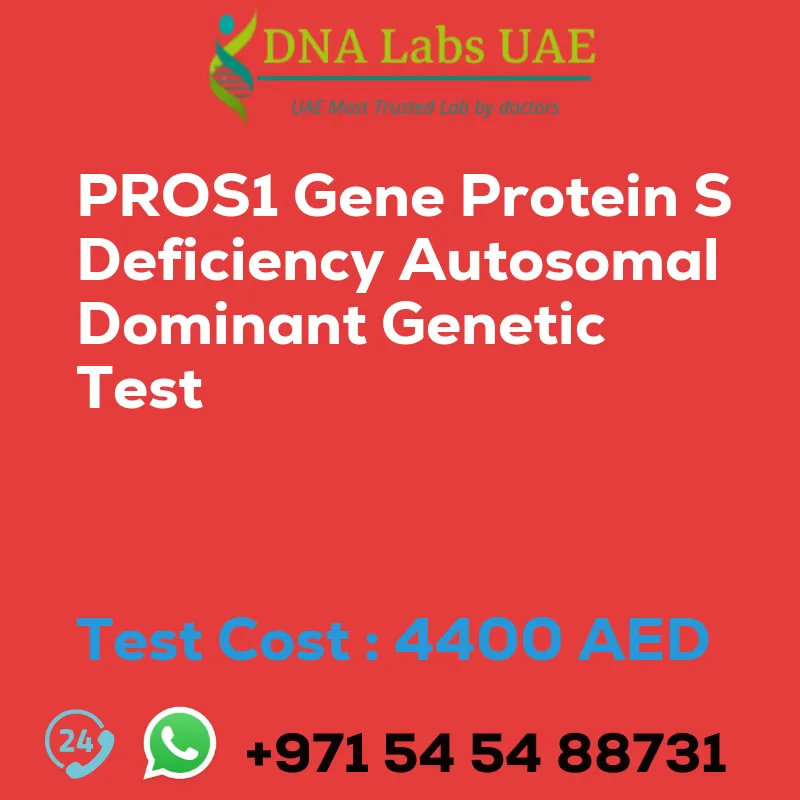PROS1 Gene Protein S Deficiency autosomal dominant Genetic Test
Test Details
Pros1 gene protein S deficiency is a genetic disorder that affects the production or function of protein S, a protein that plays a critical role in preventing blood clot formation. Autosomal dominant inheritance means that a person only needs to inherit one copy of the defective gene from either parent to develop the condition.
Next-generation sequencing (NGS) is a genetic testing method that allows for the simultaneous analysis of multiple genes. When it comes to Pros1 gene protein S deficiency, NGS genetic testing offers several advantages:
- Comprehensive analysis: NGS can analyze multiple genes simultaneously, providing a comprehensive evaluation of the genetic basis of protein S deficiency. This can help identify other potential genetic factors contributing to the disorder and rule out other related conditions.
- Cost-effective: NGS allows for the analysis of multiple genes in a single test, making it more cost-effective compared to traditional Sanger sequencing, which analyzes genes one at a time.
- Time-efficient: NGS can analyze a large number of genes within a relatively short period, providing quicker results compared to traditional sequencing methods.
- Increased diagnostic yield: NGS has a higher diagnostic yield compared to traditional methods, as it can detect a wider range of genetic variations, including single nucleotide variants, insertions, deletions, and structural rearrangements.
- Personalized treatment: NGS can help identify specific genetic mutations or variants associated with protein S deficiency, allowing for more personalized treatment and management plans.
- Family planning: NGS can identify genetic mutations in Pros1 gene protein S deficiency that can be passed on to future generations. This information can be used for family planning decisions and genetic counseling.
It is important to note that while NGS offers several advantages, it also has limitations, such as the potential for identifying variants of uncertain significance and the need for additional confirmatory testing. Therefore, it is crucial to consult with a genetic counselor or healthcare professional to fully understand the implications of NGS testing and its results.
Test Name: PROS1 Gene Protein S Deficiency autosomal dominant Genetic Test
Components
Price: 4400.0 AED
Sample Condition: Blood or Extracted DNA or One drop Blood on FTA Card
Report Delivery: 3 to 4 Weeks
Method: NGS Technology
Test type: Vascular Diseases
Doctor: General Physician
Test Department: Genetics
Pre Test Information
Clinical History of Patient who is going for PROS1 Gene Protein S Deficiency, autosomal dominant NGS Genetic DNA Test. A Genetic Counselling session to draw a pedigree chart of family members affected with PROS1 Gene Protein S Deficiency, autosomal dominant NGS Genetic DNA Test gene PROS1
| Test Name | PROS1 Gene Protein S Deficiency autosomal dominant Genetic Test |
|---|---|
| Components | |
| Price | 4400.0 AED |
| Sample Condition | Blood or Extracted DNA or One drop Blood on FTA Card |
| Report Delivery | 3 to 4 Weeks |
| Method | NGS Technology |
| Test type | Vascular Diseases |
| Doctor | General Physician |
| Test Department: | Genetics |
| Pre Test Information | Clinical History of Patient who is going for PROS1 Gene Protein S Deficiency, autosomal dominant NGS Genetic DNA Test. A Genetic Counselling session to draw a pedigree chart of family members affected with PROS1 Gene Protein S Deficiency, autosomal dominant NGS Genetic DNA Test gene PROS1 |
| Test Details |
Pros1 gene protein S deficiency is a genetic disorder that affects the production or function of protein S, a protein that plays a critical role in preventing blood clot formation. Autosomal dominant inheritance means that a person only needs to inherit one copy of the defective gene from either parent to develop the condition. Next-generation sequencing (NGS) is a genetic testing method that allows for the simultaneous analysis of multiple genes. When it comes to Pros1 gene protein S deficiency, NGS genetic testing offers several advantages: 1. Comprehensive analysis: NGS can analyze multiple genes simultaneously, providing a comprehensive evaluation of the genetic basis of protein S deficiency. This can help identify other potential genetic factors contributing to the disorder and rule out other related conditions. 2. Cost-effective: NGS allows for the analysis of multiple genes in a single test, making it more cost-effective compared to traditional Sanger sequencing, which analyzes genes one at a time. 3. Time-efficient: NGS can analyze a large number of genes within a relatively short period, providing quicker results compared to traditional sequencing methods. 4. Increased diagnostic yield: NGS has a higher diagnostic yield compared to traditional methods, as it can detect a wider range of genetic variations, including single nucleotide variants, insertions, deletions, and structural rearrangements. 5. Personalized treatment: NGS can help identify specific genetic mutations or variants associated with protein S deficiency, allowing for more personalized treatment and management plans. 6. Family planning: NGS can identify genetic mutations in Pros1 gene protein S deficiency that can be passed on to future generations. This information can be used for family planning decisions and genetic counseling. It is important to note that while NGS offers several advantages, it also has limitations, such as the potential for identifying variants of uncertain significance and the need for additional confirmatory testing. Therefore, it is crucial to consult with a genetic counselor or healthcare professional to fully understand the implications of NGS testing and its results. |








